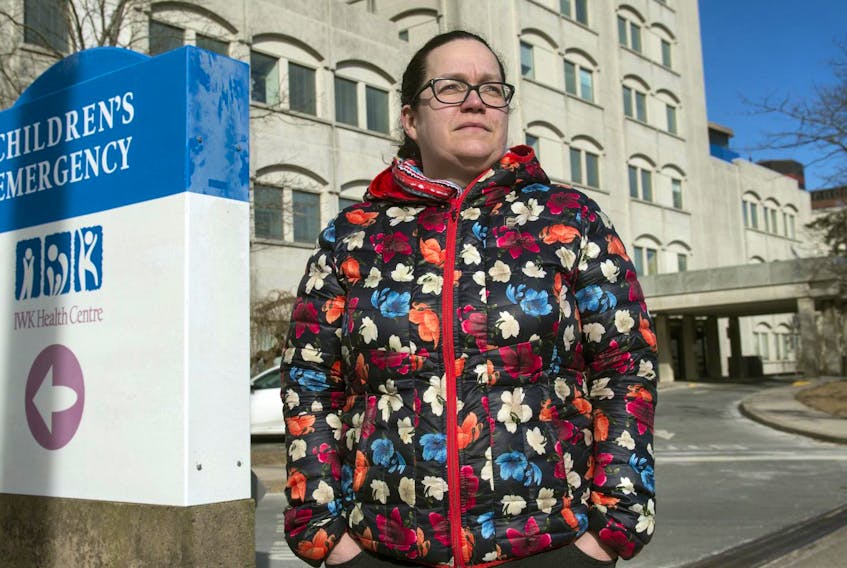“I’ve asked for help repeatedly in the last 48 hours and not receiving that help and I feel like if he dies this weekend, I have no choice but to just sit back and let it happen because I keep asking you for help and you keep sending me home.”
It was the third time in 48 hours that Tara Mills had brought her son into the IWK Health Centre’s mental health emergency unit and she’d had enough.
The 13-year-old had hurt himself and had been talking about suicide but staff had told her to take him home on Feb. 6 and Feb. 7.
The boy (Mills didn’t want his name used) has been treated for autism and another undiagnosed mental health disorder since he was seven.
“To me it’s not even a judgment call,” said Mills, a quiet-spoken arts teacher and mother of two other children, a daughter aged 11 and a six-year-old boy.
“He’s shown up here with police, paramedics, mom, principal (of Churchill Academy, where he’s a student),” the Dartmouth woman said in a recent interview.
“He’s totally out of control, he’s bleeding on his head because he’s banging his head, he’s had cords wrapped around his neck and it has marks over it, his arms are all cut up.”
The response should have been “Done, you stay,” Mills said, but instead, staff told her to keep him more involved with family activities and keep him away from dangerous objects such as knives.
“I’ve asked for help repeatedly in the last 48 hours and not receiving that help and I feel like if he dies this weekend, I have no choice but to just sit back and let it happen because I keep asking you for help and you keep sending me home.”
The breaking point came on Friday night when the family returned to the IWK for the third time.
“They put us back in the mental health crisis room, the room that locks so people can’t come in and out,” Mills recounted. “Two social workers walked into the room, one of whom I knew from the Wednesday night, and the other one I didn’t know. We were greeted in a very jovial, ‘Well hi!’ and I lost my temper. I said we need your (expletive) help. And I was reprimanded and told to watch my tone.”
The social worker who scolded her went into another room, closed the door and didn’t communicate with her again, she said.
“I was sitting in a chair opposite the door with my six-year-old in my lap and I had my hands around him,” Mills said when asked if it was possible the social worker felt threatened.
“I was certainly loud, I don’t think you would have heard me outside of the room. I definitely wasn’t yelling, I was angry. I might even have gotten quieter when I dropped the F word. It was a response to the happiness that entered the room.”
Her son was admitted that evening into the IWK’s Garron Centre for Child & Adolescent Mental Health, an acute inpatient care room. Patients are admitted to the Garron Centre for 24 to 48 hours, for those who need short-term support to resolve a crisis, or for a few days or more, “for those whose mental health difficulties need to be assessed and diagnosed, and treatments recommended,” according to the IWK’s website.
“When a man uses a well-placed swear word, they are often deemed as powerful and exerting authority and a woman does it, they’re seen as crazy”
In response to the handling of her son’s case, Mills wrote a letter to the IWK, The Chronicle Herald and others including her MLA Claudia Chender (Dartmouth South), who’s also a family friend.
“As Tara said, she at a certain point, she might have to wake up and not have her son anymore,” said Chender, who was interviewed with Mills at the NDP caucus office. “This after presenting at the region’s leading hospital, the IWK, three times with a child, as Tara said, who is bleeding and restrained by police and had choke marks around his neck. I mean that’s just completely unacceptable.”
As for the social workers’ reaction to Mills’ profanity, Chender said the staff’s response likely would have been different if it was a father expressing frustration.
“When a man uses a well-placed swear word, they are often deemed as powerful and exerting authority and a woman does it, they’re seen as crazy,” Chender said.
“So I think that’s an important piece of this story. As Tara said, when she showed up, what would have made the difference? For her voice to have been heard and respected. And for her knowledge about the situation with her son. Not only did that not happen, but the opposite happened, she was in fact left out and made to doubt herself, which I just think is unconscionable.”
Nobody from the IWK was made available for an interview.
In an email relayed by a communications staffer, Maureen Brennan, the IWK’s director of mental health and addictions, said patients visiting the emergency department are triaged based on standard criteria. They are assessed by a team that includes nurses, an emergency physician and the Emergency Mental Health and Addictions Service, “which is comprised of experienced mental health nurses and social workers.
“As with any ED presentation, the team works with patients and families to assess the presentation including the risk profile,” Brennan said in the email. “This assessment is based on collecting information about the primary reason for the ED visit and related symptoms, as well as from direct clinical observations of the patient over the course of their time in the ED. With this information they can recommend the appropriate next step in care which can include: community-based services, outpatient mental health and addictions services, urgent care clinics, emergency psychiatry and inpatient services.”
Mills said she met with a manager at the IWK’s mental health emergency department this week and it was admitted the situation could have been better handled.
Her son will be treated as a complex care patient from now on, which means his file will be flagged for future emergency department visits.
“It will give a little bit of history, it will give his diagnosis (and) guidelines for approaching the situation,” said Mills, an Ontario native who moved to Nova Scotia from Cincinnati in 2012.
“I did my research on where we’d get the best care for him and the best education. Excellent respite funding, we have Churchill Academy,” which specializes in care for children with mental health disorders.
Her son has improved dramatically over the past six years. As a child, there had been violent incidents.
“This is a blip, we’ve come really far. His siblings aren’t afraid of him anymore. He’s mostly safe and mostly happy,” said Mills, who wanted it made clear that while his disorder has its challenges, it’s not the cliched situation of a single mom struggling to keep her home together.
“If they knew me, they would know that I do have a full plate and it’s a joyful one and I’m happy to do it,” she said.
Her advice to people in the mental health system who deal with families with children with autism spectrum disorder and other mental health disorders?
“Just listen.”
RELATED: COMMENTARY: IWK sent my suicidal son home twice in two days, so yes, I got angry









